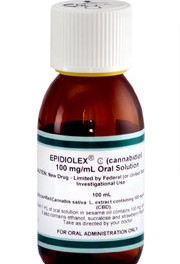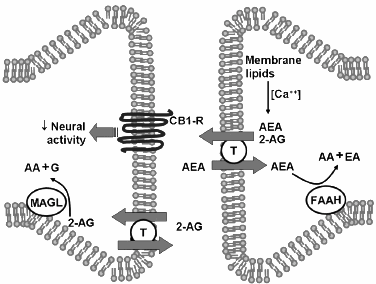Epidiolex Achieves its Goal in Phase 3 Trial
March 14, 2016 GW Pharmaceuticals announced today that its Phase 3 clinical trial of Epidiolex —a plant extract with cannabinoid content that is 99% cannabidiol (CBD)— has met its primary endpoint in reducing seizures in Dravet syndrome patients. Almost certainly, the FDA will now acknowledge that compounds in Cannabis have medical benefit, and the plant’s status on Schedule I of the federal Controlled Substance Act will become untenable. (As if it hasn’t been all these years!) O’Shaughnessy’s current issue provides the broad context of the story.
The following is from GWP’s March 14 press release, which caused its stock to more than double on the London exchange this morning:
GW Pharmaceuticals, a biopharmaceutical company focused on discovering, developing and commercializing novel therapeutics from its proprietary cannabinoid product platform, announces the positive results of the first pivotal Phase 3 study of its investigational medicine Epidiolex® (cannabidiol or CBD) for the treatment of Dravet syndrome. In this study, Epidiolex achieved the primary endpoint of a significant reduction in convulsive seizures assessed over the entire treatment period compared with placebo (p=0.01). Epidiolex has both Orphan Drug Designation and Fast Track Designation from the U.S. Food and Drug Administration (FDA) in the treatment of Dravet syndrome, a rare and debilitating type of epilepsy for which there are currently no treatments approved in the U.S.
“The results of this Epidiolex pivotal trial are important and exciting as they represent the first placebo-controlled evidence to support the safety and efficacy of pharmaceutical cannabidiol in children with Dravet syndrome, one of the most severe and difficult-to-treat types of epilepsy,” said Orrin Devinsky, M.D.of New York University Langone Medical Center’s Comprehensive Epilepsy Center. “These data demonstrate that Epidiolex delivers clinically important reductions in seizure frequency together with an acceptable safety and tolerability profile, providing the epilepsy community with the prospect of an appropriately standardized and tested pharmaceutical formulation of cannabidiol being made available by prescription in the future
“The positive outcome of this Phase 3 trial is a significant milestone in the development of Epidiolex as a potential new treatment for patients suffering from Dravet syndrome. We are excited about the potential for Epidiolex to become the first FDA approved treatment option specifically for Dravet syndrome patients and their families,” stated Justin Gover, GW’s Chief Executive Officer. “In light of this positive data, we will now request a pre-NDA meeting with the FDA to discuss our proposed regulatory submission. We also look forward with excitement to the upcoming results from the two Phase 3 trials in Lennox-Gastaut syndrome and the second pivotal trial in Dravet syndrome.”
“Dravet syndrome is one of the most catastrophic types of epilepsy in children and safe and effective treatments are desperately needed. We are thrilled to learn of these positive results, which bring much needed hope to the children and families who have been living with these debilitating seizures,” said Mary Anne Meskis, Executive Director of the Dravet Syndrome Foundation.
Study Overview
The Phase 3 study randomized 120 patients into two arms, Epidiolex 20mg/kg/day (n=61) and placebo (n=59). Epidiolex or placebo was added to current anti-epileptic drug (AED) treatment regimens. On average, patients were taking approximately 3 AEDs, having previously tried and failed an average of more than 4 other AEDs. The average age of trial participants was 10 years and 30 percent of patients were less than 6 years of age. The median baseline convulsive seizure frequency per month was 13.
The primary efficacy endpoint was a comparison between Epidiolex and placebo measuring the percentage change in the monthly frequency of convulsive seizures during the 14-week treatment period compared with the 4-week baseline observation period. In this study, patients taking Epidiolex achieved a median reduction in monthly convulsive seizures of 39 percent compared with a reduction on placebo of 13 percent, which was highly statistically significant (p=0.01). A series of sensitivity analyses of the primary endpoint confirmed the robustness of this result. The difference between Epidiolex and placebo emerged during the first month of treatment and was sustained during the entire treatment period.
Results from secondary efficacy endpoints reinforced the overall effectiveness observed with Epidiolex.
Epidiolex was generally well tolerated in this study. The most common adverse events (occurring in greater than 10 percent of Epidiolex-treated patients) were: somnolence, diarrhea, decreased appetite, fatigue, pyrexia, vomiting, lethargy, upper respiratory tract infection and convulsion. Of those patients on Epidiolex that reported an adverse event, 84 percent reported it to be mild or moderate. Ten patients on Epidiolex experienced a serious adverse event compared with three patients on placebo. Eight patients on Epidiolex discontinued treatment due to adverse events compared with one patient on placebo.
Further data will be presented in future publications and medical meetings.
In addition to this first Phase 3 trial, GW is conducting a second Phase 3 trial in Dravet syndrome which is recruiting 150 patients.
About Epidiolex (cannabidiol)
Epidiolex, GW’s lead cannabinoid product candidate, is a liquid formulation of pure plant-derived CBD, which is in development for the treatment of a number of rare childhood-onset epilepsy disorders. GW has conducted extensive pre-clinical research of CBD in epilepsy since 2007. This research has shown that CBD has significant anti-epileptiform and anticonvulsant activity using a variety of in vitro and in vivo models and has the ability to treat seizures in acute animal models of epilepsy with significantly fewer side effects than existing anti-epileptic drugs. To date, GW has received Orphan Drug Designation from the FDA for Epidiolex in the treatment of both Dravet syndrome and Lennox-Gastaut syndrome. Additionally, GW has received Fast Track Designation from the FDA and Orphan Designation from the European Medicines Agency for Epidiolex for the treatment of Dravet syndrome. GW is currently evaluating additional clinical development programs in other orphan seizure disorders.
About GW Pharmaceuticals plc
Founded in 1998, GW is a biopharmaceutical company focused on discovering, developing and commercializing novel therapeutics from its proprietary cannabinoid product platform in a broad range of disease areas. GW commercialized the world’s first plant-derived cannabinoid prescription drug, Sativex®, which is approved for the treatment of spasticity due to multiple sclerosis in 28 countries outside the United States. GW is advancing an orphan drug program in the field of childhood epilepsy with a focus on Epidiolex® (cannabidiol), which is in Phase 3 clinical development for the treatment of Dravet syndrome and Lennox-Gastaut syndrome and which is also expected to enter Phase 3 clinical trials in the treatment of Tuberous Sclerosis Complex. GW has a deep pipeline of additional cannabinoid product candidates which includes compounds in Phase 1 and 2 trials for glioma, type 2 diabetes, schizophrenia and epilepsy.



